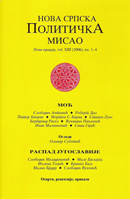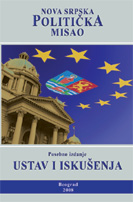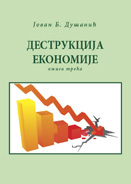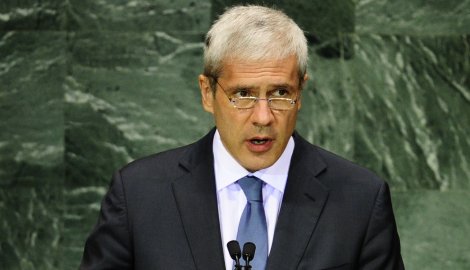| NSPM in English | |||
We are now ready to talk and we will do so in good faith |
 |
 |
 |
| субота, 25. септембар 2010. | |
|
Excellencies, Ladies and Gentlemen, I stand before you gratified and in a position to salute you, the General Assembly, for playing a very important part in the process towards reconciliation in my region, and for supporting the consolidation of the new, modern Serbia. In a few days, we will proudly celebrate the 10th anniversary of our peaceful democratic revolution. In a world confronted by so many threats, the United Nations must constantly reaffirm its original purpose and adapt to new challenges. The United Nations has confronted, through its many agencies, the scourges of discrimination, disease, hunger, poverty and environmental degradation. In other words, the United Nations has built a capacity to create rules that transcend frontiers – rules that we all respect. One thing that we have all embraced, as member States of the United Nations, is to find solutions to all challenges through peaceful means, dialogue and consensus. Ladies and Gentlemen, I opened with a specific reference to the General Assembly. A few weeks ago, the General Assembly adopted by acclamation a resolution –proposed by Serbia and co-sponsored by the 27 Member States of the European Union – that acknowledged the content of the opinion of the International Court of Justice regarding the unilateral declaration of independence of Kosovo. This resolution is fundamentally status-neutral with regards to the status of Kosovo. All other interpretations do not correspond to the truth. The resolution welcomed the EU’s readiness to facilitate a process of dialogue between the parties. Serbia welcomes this resolution. We look forward to engage in the process that will hopefully lead to a mutually-acceptable compromise solution to the problem of Kosovo. We feel vindicated in our contention that the path to dialogue lay through the natural process of international legitimacy – the General Assembly sought an opinion for the ICJ. The ICJ delivered an opinion. The General Assembly has now, as a consequence called for dialogue. Moreover, that request comes as a consequence of a joint effort between Serbia and the EU. In light of this, we sought the re-affirmation of the validity of the international system as we know it. We feel proud that our faith in this process has produced results. We have always said we are ready to engage in dialogue. But that dialogue must be framed by rules and accountability and this has been achieved through the latest vote of the General Assembly. Many have been involved in this process and we are grateful for the contributions of all in the debate on the resolution that expressed understanding for the position of Serbia. Our issue has been the first test of the new post-Lisbon institutions of the European Union—which we consider our natural and eventual home. We are encouraged by the commitment and sense of purpose of the leadership of these new institutions. Ladies and Gentlemen, We should be very clear. Serbia has always maintained that the attempt to secede unilaterally is a violation of the basic principles of the United Nations Charter, the Helsinki Final Act and of the UN Security Council Resolution 1244 (1999). A vast majority of UN member States have refrained from recognizing Kosovo’s UDI—or unilateral declaration of independence. They have continued to abide by their UN Charter obligations to respect the sovereignty and territorial integrity of my country. On behalf of the Republic of Serbia, allow me once again to sincerely thank these countries for their support and solidarity. Serbia’s position remains unchanged. The unilaterally declared independence of Kosovo will not be recognized by Serbia explicitly or implicitly. This is enshrined in our constitution. This is why we have repeatedly said we seek dialogue but within a framework of globally acknowledged law. The law of the United Nations. Fr this reason we insisted on the process of seeking the opinion of the International Court of Justice and the subsequent resolution related to the Court’s opinion at the General Assembly. Let me be very clear as to what the Court said and did not say. The ICJ’s advisory opinion reaffirmed that Kosovo remains under the interim administrationof the United Nations and that the Security Council Resolution 1244 (1999) and that the UN’s Constitutional Framework for Provisional Self Government in Kosovo stays in force and continue to apply – meaning that this part of our territory remains subject to an international regime mandated by the Security Council. The centrality and leading role of the Security Council in determining the comprehensive settlement of the Kosovo issue remains paramount, and would provide legitimacy to the result. The Court also did not endorse the view that Kosovo’s UDI was sui generis—a unique case. Nor did it endorse any purported right to self-determination for the province’s ethnic Albanians. The Court chose to examine the language of Kosovo’s Unilateral Declaration of Independence and the Court held the view that the text of the Declaration itself did not contain anything that violates international law. The Court, thus, did not approve the province’s right to secession from Serbia nor did it support the claim that Kosovo is a sovereign state. The Court’s opinion is clear: the UDI was only “an attempt to determine finally the status of Kosovo. The General Assembly resolution relating to the Court’s opinion acknowledged this content of the Court’s advisory opinion. It is within this framework that we are ready to follow your resolution and to engage in the dialogue called for in your resolution. We are now ready to talk and we will do so in good faith. As such, Serbia asks you all to engage fully in the spirit of your vote in this Assembly in which you called for a dialogue to be facilitated by the European Union. A dialogue requires trust. Soon the two parties will be talking to each other for the first time in many years. We must be patient and seek out those issues which allow confidence to be built on each side. There will be many issues to discuss and some of them will be complicated. You all can contribute to an atmosphere that creates trust. We are entering a phase in which creative solutions require political imagination a respect for our own democratic institutions and great skill. I trust that we can enter a phase in which all parties will leave behind them anachronistic analyses and diplomatic ambushes. We must be able to build confidence to have trust. Serbia believes that the continued pursuit of recognitions is futile and counter-productive to the spirit in which we now enter. Everyone who wanted to make their point has made it – and, we still do not have a clear settlement. I want to underline that it is of critical importance for the UN member States that have not recognized Kosovo’s UDI to stay the course on non-recognition over the course of the dialogue process. This will be a significant contribution to ensuring that unilateral attempts to impose outcomes to ethnic and territorial disputes are not legitimized, thereby preventing Kosovo’s UDI from becoming a dangerous and destabilizing precedent. Until now, statehood has never been attained without the consent of the parent state. A durable settlement on an issue of such magnitude and sensitivity has never been the product of compulsion—it always necessitates consent. It would be equally harmful if there were attempts to alter realities on the ground while discussions get underway. Any attempt to change these realities through the use of force would bring an immediate end to the process of dialogue. Ladies and Gentlemen, I address you today as a leader who believes that the future lies in seeking reconciliation. Our National Assembly adopted a historic Declaration on Srebrenica: a crime was condemned and an apology was extended. There is little precedent for such an action and I am proud in that it demonstrates the maturity of the democracy of Serbia. I hope that more such gestures throughout our region will help us create a new region in which our shared history will unite us morally rather than divide us politically. For this, surely, is the foundation upon which the future will be built. It is also true that our region is changing. To a very large extent, it is changing to the good. We should recognize the many new levels of cooperation that exist in our region. In fact the Western Balkans – which has been affected by the financial crisis – is a story of many small and larger incremental successes. In fact, relations have never been better. But the region must also acknowledge that as it develops, its successes can generate new challenges. There is one area, therefore, on which I wish to speak with a clarity that may be deemed undiplomatic. Ladies and Gentlemen, Organized crime is now a global industry. It is the dark side of globalization. It attaches itself to weak societies. It attaches itself to political and religious extremists. It attempts to buy and subvert democracies. Like water, its spreads to where it finds least resistance. It is global and globalised in its inter-connections. Organized crime, I want to tell you emphatically, is in the Western Balkans. And I consider it to be the greatest single challenge to my country and, if I may say, to the whole region. It always has been present and was given solid foundations because of the wars in our region.. But, I fear that it is developing capabilities – acquired from the globalization of crime and access to technology – at a much faster pace. These criminals are bringing drugs, guns, human trafficking and corruption into our societies. In doing so, they are using our region to spread into Europe. I fear that we are in a race against time in our region. The stark choice is that Southeastern Europe will become either a valuable bridge between Europe and vital areas to the East or it will become the beachhead of organized crime trying to reach Europe. We have a common responsibility as leaders in our region to eliminate this scourge on our societies, and Serbia will spare no effort in our quest to eradicate this threat. It is our responsibility to all our neighbors. For this reason there has been a growing number of meetings and consultations between us in the region on this matter. But, today, I want to say that this issue cannot be addressed tactically and occasionally. It is a strategic issue that affects all of Europe. I am therefore asking that we all become alert to the next generation of threat. In our region, we have a responsibility to create a strategic alliance against organized crime. We hope that all Western Balkan states will make fighting it a priority. We owe this to our citizens, we owe it to our neighbors in the European Union, and we owe it to the next generation. Ladies and Gentlemen, Serbia has historically been part of global movements. This is why we are totally engaged in achieving membership of the European Union. This is why we support the UN system. This is also why we are now moving to re-activate the many relationships we build historically, as part ofthe Non-Aligned Movement. My country is the largest successor to a founding member of the Movement. Serbia’s capital, Belgrade, was the site of the First NAM Summit in 1961. I am proud that one of the capstone events marking its fiftieth anniversary will be celebrated in Belgrade next September. As part of our commitment to the Millennium Development Goals we are strengthening many of our engagements and commitments worldwide through this Movement. We will contributing to those countries that would welcome assistance and we look to an intensification of cooperation. I hope that this is a clear signal that my government believes in an active global engagement that will contribute to both global solidarity and the achievement of the Millennium Development Goals. Thank you very much for your attention. |
Од истог аутора
Остали чланци у рубрици
- Playing With Fire in Ukraine
- Kosovo as a res extra commercium and the alchemy of colonization
- The Balkans XX years after NATO aggression: the case of the Republic of Srpska – past, present and future
- Из архиве - Remarks Before the Foreign Affairs Committee of the European Parliament
- Dysfunction in the Balkans - Can the Post-Yugoslav Settlement Survive?
- Serbia’s latest would-be savior is a modernizer, a strongman - or both
- Why the Ukraine Crisis Is the West’s Fault
- The Ghosts of World War I Circle over Ukraine
- Nato's action plan in Ukraine is right out of Dr Strangelove
- Why Yanukovych Said No to Europe

.jpg)








 Mr. President of the General Assembly,
Mr. President of the General Assembly,












